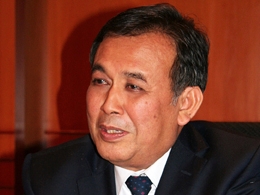New Executive Director at APEC

"It is in times of crisis that a person's true character is revealed," says Muhamad Noor Yacob, the new Executive Director at APEC and the first ever to assume a three-year term.
This may be true in general and it may be true specifically. (The global economic crisis drained a big pond and revealed all sorts of characters.) But Noor is old enough to consider his experiences retrospectively and young enough to appreciate both the wisdom and the humour in them.
He discusses the international tin market crisis of 1985:
"Malaysia does not have that much tin now but, at that time, tin accounted for 20 - 30 percent of the country's GDP. The International Tin Council intervened to stabilise the price but by October had to cease operations; and because part of the operation was financed by borrowings, banks and brokers began to sue the ITC and its members, just as the price of tin was plummeting!"
"Although the ITC was an international organisation, it was being sued in the municipal courts. So there were questions about the interface between local and international law: which one supersedes which?"
Noor might have been disenchanted by the situation but, instead, it served as a catalyst, sharpening his focus and making real to him the significance of international legal infrastructure:
"You learn about diplomacy, you learn about the Vienna Convention... only you forget it because you think you'll never need to apply it."
Noor turned to Malaysian Ambassador Peter Lai, his mentor and - conveniently - a lawyer.
"I learnt about the practice of diplomacy, negotiations and trade under his tutelage. But I respected him even more because he was a man of integrity. He would say: when you put your head on the pillow at night, you need to sleep soundly. "
"In 2003, the Malaysian Government sent me to Geneva where I spent six years as Ambassador and Permanent Representative to the World Trade Organisation."
"I worked for a Minister who insisted that I would have to do my work for Malaysia, but that I should also aspire to go beyond that. It was a particular honour, therefore, to have been elected as Chairman of the WTO General Council for 2007."
Despite the Doha Round negotiations dragging on and the propensity of the WTO to spark worldwide debate, Noor is an advocate of international cooperation. For example, he points out, if it were not for WTO rules, small developing economies would have no recourse against larger ones. The equalising effect of WTO disciplinary mechanisms have been critical to globalisation.
Conversely, he says, "The advantage of APEC is its openness to individual member initiative. The WTO functions on the basis of agreed rules, but APEC can transcend that. It is quite remarkable that a few economies can get together and try something out - and then call on others to come on board, as and when they're ready."
"Of course, the two bodies have a synergistic relationship. Both the APEC and the WTO Secretariats are now monitoring APEC members to ensure that the policy measures implemented to mitigate the impact of the economic crisis have minimal protectionist effects."
The idea of cooperation informs Noor's vision of APEC as a "zone of peace and prosperity." APEC has always focused on free trade throughout the entire region.
"The financial crisis brought to attention the need for change, Noor observes. "Now we are working toward growth that is balanced, inclusive and sustainable."
To view the Executive Director's curriculum vitae, click here.

